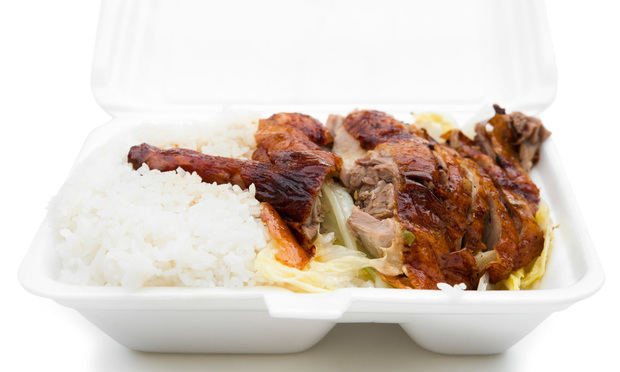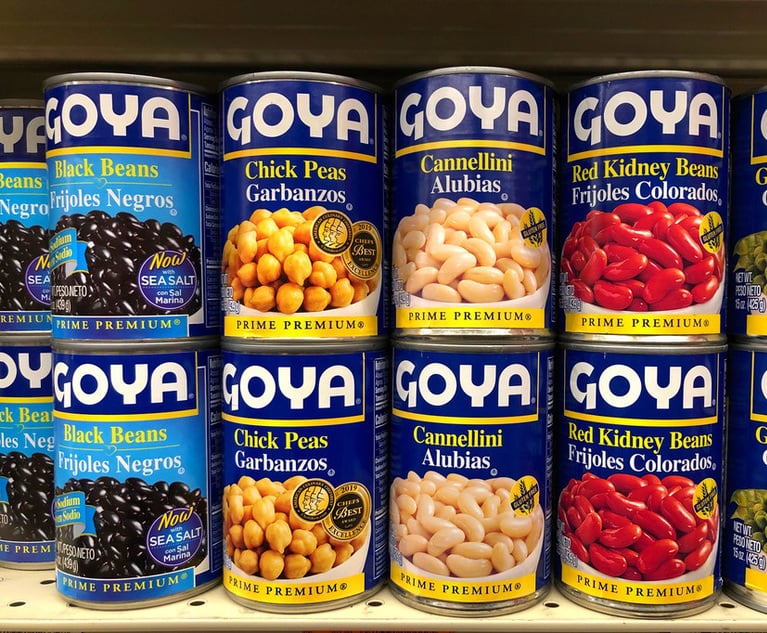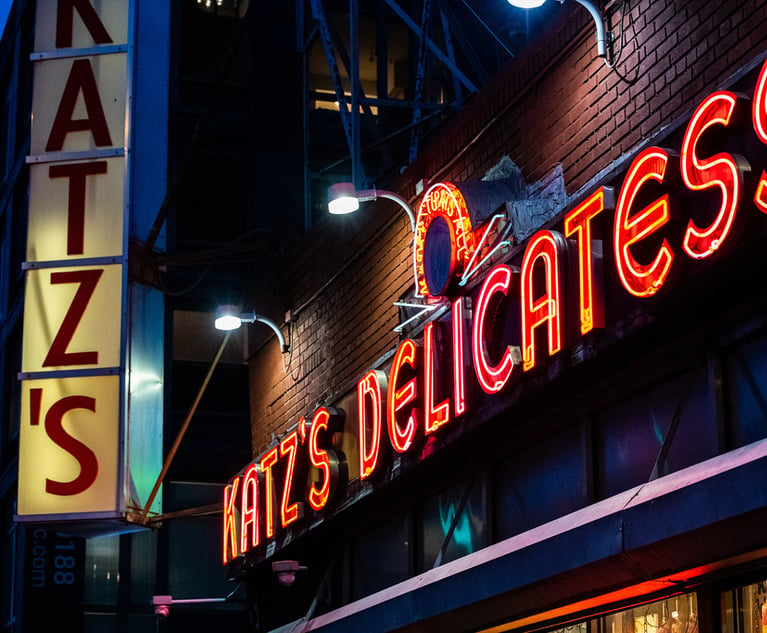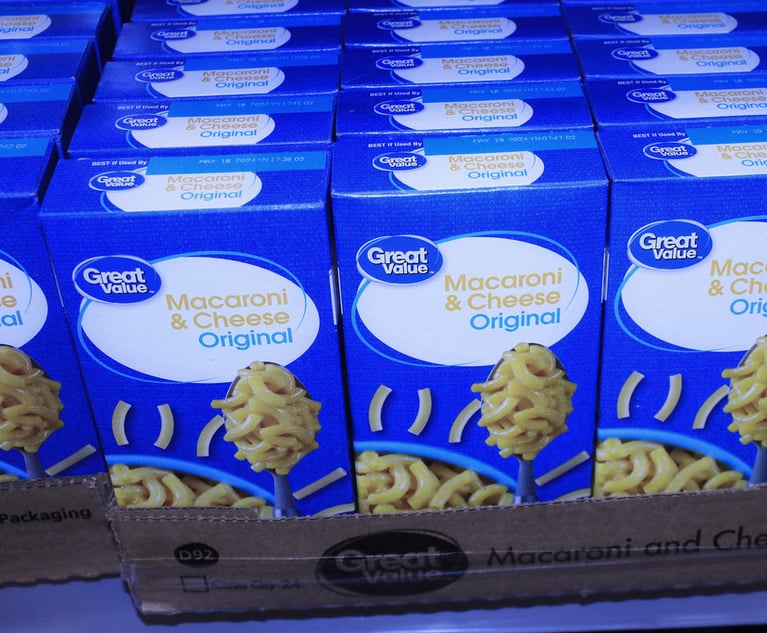City's 'Food Foam' Ban Backed by Appeals Court
The concern long expressed by the city's sanitation commissioner, and backed by the appeals court's decision, is that soft foam coffee cups, plates, egg cartons and other food containers simply end up being an environmental hazard as they pack landfills.
October 23, 2018 at 10:47 AM
4 minute read
 styrofoam takeout container. Bigstock
styrofoam takeout container. Bigstock
A state appeals court has weighed in on New York City's ban on single-use food foam containers—a long-running, environmentally-focused legal battle that dates back to 2015—clearing the way for Mayor Bill de Blasio's prohibition starting next year.
A unanimous Appellate Division, First Department panel has ruled that city Department of Sanitation Commissioner Kathryn Garcia “rationally concluded,” after detailed study, that the soft foam containers and their related products “cannot be recycled in a manner that is environmentally effective and economically feasible.”
The concern long expressed by Garcia, and backed by the appeals panel's decision, is that soft foam coffee cups, plates, egg cartons and other food containers simply end up being an environmental hazard as they pack landfills. The products—commonly referred to as Styrofoam yet actually made of polystyrene and including shipping box-filling “packing peanuts”—have been a prime target for environmentalists and zero-waste advocates for years. Garcia has said that her department's goal is allow zero waste to wind up in landfills.
Dart Container Corp., a leading manufacturer of polystyrene containers and one of the petitioners in the underlying Article 78 proceeding against the city, had offered up a plan that it said was a viable way to keep the foam out of landfills while saving the city millions of dollars. The plan included the company paying for infrastructure costs to help recycle the ubiquitous containers—which hold falafel, Chinese food and a host of other popular eats across the city—while subsidizing the market for buying the recycled foam for five years, the panel noted.
But the justices wrote that Garcia had “concluded that even if … petitioners' proposed plan succeeded in collecting and converting the material into marketable recycled products, the plan most likely would result in significant landfilling of expanded polystyrene after the five-year subsidy period.”
“This conclusion is supported by the record, including the historical evidence of efforts to undertake such recycling in other jurisdictions and the evidence indicating that no viable, nonsubsidized market for the material would exist or emerge absent the subsidy,” added panel Justices John Sweeny, Judith Gische, Angela Mazzarelli, Troy Webber and Marcy Kahn.
The petitioners—which also included the Restaurant Action Alliance NYC, a lobbying group formed to oppose the city's polystyrene targeting—have argued that the prohibition was rendered arbitrarily. But the panel wrote that Garcia's determination about the products' environmental hazards was “neither arbitrary and capricious nor without a rational basis,” citing Matter of Farrell v. New York City Police Dept. and Matter of Partnership 92 LP & Bldg. Mgt. Co., Inc. v State of N.Y. Div. of Hous. & Community Renewal.
The city first passed Local Law 142, intended to ban the polystyrene containers, in 2013, under the Bloomberg administration. The law included a provision that said the prohibition could take place if the sanitation commissioner found the polystyrene could not be recycled.
In 2015, Garcia ruled that it was not economically feasible or environmentally effective to recycle the foam. But then the legal challenge landed and, later in 2015, Manhattan Supreme Court Justice Margaret Chan ruled in favor of the ban's opponents, as she knocked Garcia's lack of clarity in explaining the reasons behind her conclusions.
In 2017, Garcia undertook a more extensive study of the recycling question, and this past June, Chan ruled that Garcia had met her burden while presenting a “painstakingly studied decision.”
About a week later, Mayor de Blasio announced that the long-fought-for ban would take effect by January 1, 2019. The petitioners, though—represented by Gibson Dunn partner Randy Mastro, a former deputy mayor of New York City—appealed to the First Department. That led to the panel's Oct. 18 decision in In re Restaurant Action Alliance NYC v. The City of New York.
A city Law Department spokesman said in a statement following the panel's ruling that the agency was pleased with it.
“While researching [the recycling] issue, the [sanitation department] learned that all previous large-scale efforts to recycle those [polystyrene] containers had failed, largely because high shipping, cleaning and converting costs made the finished product unmarketable,” Nicholas Paolucci, the spokesman, wrote.
“As a result, foam take-out containers tend to end up in landfills,” he added.
Mastro, the petitioners' lawyer, could not be reached for comment Monday.
Scott Shorr, a senior counsel at the Law Department, led the city's legal effort to defend the ban, the department noted.
This content has been archived. It is available through our partners, LexisNexis® and Bloomberg Law.
To view this content, please continue to their sites.
Not a Lexis Subscriber?
Subscribe Now
Not a Bloomberg Law Subscriber?
Subscribe Now
NOT FOR REPRINT
© 2025 ALM Global, LLC, All Rights Reserved. Request academic re-use from www.copyright.com. All other uses, submit a request to [email protected]. For more information visit Asset & Logo Licensing.
You Might Like
View All

NYC’s Oldest Deli Agrees to Update Bathrooms, Entrances to End ADA Charges
4 minute read
Ben & Jerry’s Accuses Corporate Parent of ‘Silencing’ Support for Palestinian Rights
3 minute read
Walmart Accused of Misrepresenting 'Cheese' Ingredients in Great Value's Macaroni & Cheese
3 minute readTrending Stories
- 1'A Death Sentence for TikTok'?: Litigators and Experts Weigh Impact of Potential Ban on Creators and Data Privacy
- 2Bribery Case Against Former Lt. Gov. Brian Benjamin Is Dropped
- 3‘Extremely Disturbing’: AI Firms Face Class Action by ‘Taskers’ Exposed to Traumatic Content
- 4State Appeals Court Revives BraunHagey Lawsuit Alleging $4.2M Unlawful Wire to China
- 5Invoking Trump, AG Bonta Reminds Lawyers of Duties to Noncitizens in Plea Dealing
Who Got The Work
J. Brugh Lower of Gibbons has entered an appearance for industrial equipment supplier Devco Corporation in a pending trademark infringement lawsuit. The suit, accusing the defendant of selling knock-off Graco products, was filed Dec. 18 in New Jersey District Court by Rivkin Radler on behalf of Graco Inc. and Graco Minnesota. The case, assigned to U.S. District Judge Zahid N. Quraishi, is 3:24-cv-11294, Graco Inc. et al v. Devco Corporation.
Who Got The Work
Rebecca Maller-Stein and Kent A. Yalowitz of Arnold & Porter Kaye Scholer have entered their appearances for Hanaco Venture Capital and its executives, Lior Prosor and David Frankel, in a pending securities lawsuit. The action, filed on Dec. 24 in New York Southern District Court by Zell, Aron & Co. on behalf of Goldeneye Advisors, accuses the defendants of negligently and fraudulently managing the plaintiff's $1 million investment. The case, assigned to U.S. District Judge Vernon S. Broderick, is 1:24-cv-09918, Goldeneye Advisors, LLC v. Hanaco Venture Capital, Ltd. et al.
Who Got The Work
Attorneys from A&O Shearman has stepped in as defense counsel for Toronto-Dominion Bank and other defendants in a pending securities class action. The suit, filed Dec. 11 in New York Southern District Court by Bleichmar Fonti & Auld, accuses the defendants of concealing the bank's 'pervasive' deficiencies in regards to its compliance with the Bank Secrecy Act and the quality of its anti-money laundering controls. The case, assigned to U.S. District Judge Arun Subramanian, is 1:24-cv-09445, Gonzalez v. The Toronto-Dominion Bank et al.
Who Got The Work
Crown Castle International, a Pennsylvania company providing shared communications infrastructure, has turned to Luke D. Wolf of Gordon Rees Scully Mansukhani to fend off a pending breach-of-contract lawsuit. The court action, filed Nov. 25 in Michigan Eastern District Court by Hooper Hathaway PC on behalf of The Town Residences LLC, accuses Crown Castle of failing to transfer approximately $30,000 in utility payments from T-Mobile in breach of a roof-top lease and assignment agreement. The case, assigned to U.S. District Judge Susan K. Declercq, is 2:24-cv-13131, The Town Residences LLC v. T-Mobile US, Inc. et al.
Who Got The Work
Wilfred P. Coronato and Daniel M. Schwartz of McCarter & English have stepped in as defense counsel to Electrolux Home Products Inc. in a pending product liability lawsuit. The court action, filed Nov. 26 in New York Eastern District Court by Poulos Lopiccolo PC and Nagel Rice LLP on behalf of David Stern, alleges that the defendant's refrigerators’ drawers and shelving repeatedly break and fall apart within months after purchase. The case, assigned to U.S. District Judge Joan M. Azrack, is 2:24-cv-08204, Stern v. Electrolux Home Products, Inc.
Featured Firms
Law Offices of Gary Martin Hays & Associates, P.C.
(470) 294-1674
Law Offices of Mark E. Salomone
(857) 444-6468
Smith & Hassler
(713) 739-1250






